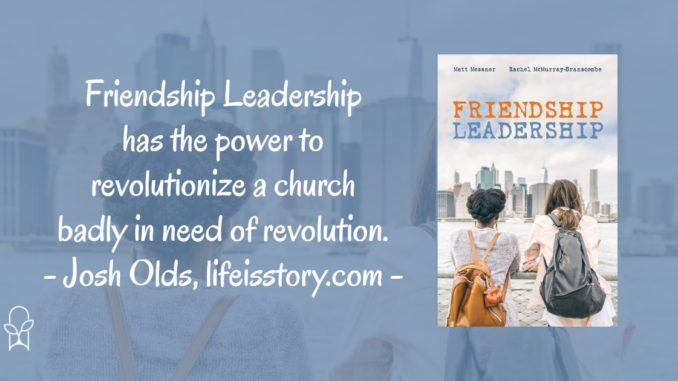
Published by Wipf & Stock Publishers on November 29, 2018
Genres: Non-Fiction, Christian Life, Leadership
Buy on Amazon
Goodreads

No one can deny that friendships are powerful relationships of influence. Why not strategically incorporate friendship within a philosophy of leadership? People long for relational models of leadership, yet few specific methodologies have been developed. This book examines the friendship of God with humanity, and the leadership of Jesus with his disciples, to whom he declared, ""I no longer call you servants . . . Instead, I have called you friends"" (John 15:15). In response to this enduring example of the Divine bringing together both friendship and leadership, this book presents an unexplored model of leadership for the Christian practitioner: Friendship Leadership. The authors of Friendship Leadership share research, historical examples, and their personal experiences with this leadership model, as they describe both the trials and triumphs. Through this process, the book addresses the primary barriers a leader might experience when utilizing the Friendship Leadership model. Finally, the authors offer a guide for how to incorporate friendship into their leadership, strengthening others as they follow the example of our great Leader. The result is a transformational way of leading that nurtures relationships. ""Matt Messner is a deep thinker with a delightful sense of humor. His words will strengthen your relationships and empower you to be the leader you've always dreamed of!"" --Margaret Feinberg, author of Taste and See: An Aspiring Foodie's Search for God Among Butchers, Bakers, and Fresh Food Makers ""Jesus called his leaders friends. . . . Can a leader be friends with those they lead? I always said: 'no.' This book, however, changed my mind. Not only have Messner and McMurray-Branscombe written a brilliant expose on the traps and dangers of failing to befriend those we are trusted to lead, we now have an argument for why it's ideal--if not Christ-like--to befriend those we lead. I hated this book. It held up a mirror to my folly."" --A.J. Swoboda, pastor, teacher, and author of Subversive Sabbath Matt Messner is the lead pastor at Faith Center in Eureka, California. He has taught at Fuller Theological Seminary, LIFE Pacific College, King's College and Seminary, and is on the faculty of Perspectives on the World Christian Movement. Matt earned his BA at LIFE Pacific College, an MA from Fuller Theological Seminary and a DMin from Gordon-Conwell Theological Seminary. Rachel McMurray-Branscombe is a full-time writer, with a background in church ministry, missions, anthropology, and leadership. She graduated from Fuller Theological Seminary with a Master of Arts in Global Leadership, specializing in International Development and Urban Studies. Rachel served in vocational ministry for ten years as an ordained Foursquare minister.
If you’re a part of any Christian organization, I guarantee that you’ve heard of the term “servant leadership.” First coined in the secular sphere by Robert Greenleaf in the 1970s, servant leadership has become a very popular model for leadership in both secular and religious spaces. Within the church, even if the model itself is not adhered to strictly, the nomenclature is pervasive. Christian culture believes that the Christian leader is a servant leader.
And into that conversation, Matthew Messner and Rachel McMurray-Branscombe, raise their hands and say “But…what of friendship?” Historically, it has been difficult for pastors to develop friendship within their congregations. Many pastors report that friendships with their congregations have been discouraged by seminaries and denominational leadership alike. But to Messner and McMurray-Branscombe, friendship is the lynchpin for all leadership.
Friendship Leadership bases itself on John 15:15, where Jesus says “I no longer call you servants…but friends” to establish the idea that Christian leadership is one founded in relationship and community. In the first part of the book, Messner provides the theological and sociological foundations of friendship leadership. The first chapter develops the friendship of God. The second chapter develops the importance of friendship and community among people, using Scripture as support.
The second part develops what friendship leadership is and how it should be practiced. Messner and McMurray Branscombe writes that friendship should be a loving relationship of interdependence freely chosen by both people, built upon trust and self-disclosure, acted upon with care and sacrifice. Thus, leadership in this context is one individual using that relationship to guide, direct, exhort, or encourage the other person toward growth—particularly growth in Christ. They write about how friendship vitalizes and revolutionizes the workplace to enhance productivity and increase morale. They talk about how a lack of friendship leads to poor mental health and poorer working conditions. Even though friendship has been eschewed in favor of “professionalism,” there must be a balance that allows opportunities for friendship.
I particularly found their critique of servant leadership to be interesting. I think a lot of people use the term in Christian leadership and don’t really think about it. But the more I’ve studied it as a doctoral student, the more convinced I am that it’s a flawed concept. Friendship Leadership notes that servant leadership can cause burnout, depression, and isolation as pastors are separated from the community they serve. It can lead to works-based service of obligation rather than grace-based service out of mutuality and friendship.
However, Friendship Leadership is not without its challenges, something that the final part in the book outlines. Fortunately, Messner and McMurray Branscombe have adequate rebuttals to these challenges and encourage readers to develop friendship in a way that is healthy, professional, and communal. It’s going to take a change in the way we do church for this model to supplant servant leadership, but in my opinion Friendship Leadership has the power to revolutionize a church badly in need of revolution.



